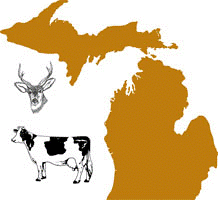Wildlife Disease and Zoonotics

Michigan Bovine Tuberculosis Bibliography and Database
Date of this Version
2002
Abstract
White-tailed deer (Odocoileus virginianus) have recently emerged as a source of Mycobacterium bovis infection for cattle within North America. The objective of this study was to evaluate the antibody response of M. bovis–infected deer to crude mycobacterial antigens. Deer were experimentally inoculated with M. bovis strain 1315 either by intratonsilar instillation or by exposure to M. bovis–infected (i.e., in contact) deer. To determine the time course of the response, including the effects of antigen administration for comparative cervical skin testing, serum was collected periodically and evaluated by enzyme-linked immunosorbent assay (ELISA) for immunoglobulin (i.e., IgG heavy and light chains) reactivity to mycobacterial antigens. The reactivity to M. bovis purified protein derivative (PPDb) exceeded (P < 0.05) the reactivity to M. avium PPD (PPDa) only after in vivo administration of PPDa and PPDb for comparative cervical testing of the infected deer. The mean immunoglobulin response, as measured by ELISA, of intratonsilar-inoculated deer to a proteinase K–digested whole-cell sonicate (WCS-PK) of M. bovis strain 1315 exceeded (P < 0.05) the mean of the prechallenge responses to this antigen at approximately 1 month after inoculation and throughout the remainder of the study (i.e., ~11 months). This response also exceeded (P < 0.05) that of the uninfected deer. Although this is encouraging, further studies are necessary to validate the use of the proteinase K–digested M. bovis antigens in the antibody-based assays of tuberculosis.


Comments
Published in J Vet Diagn Invest 14:470–475 (2002).